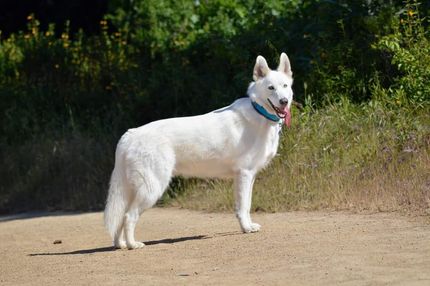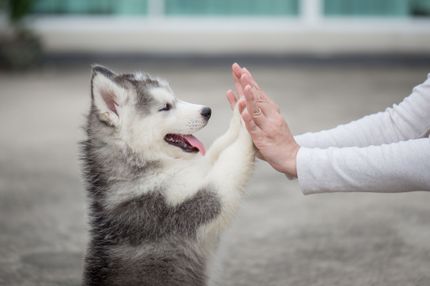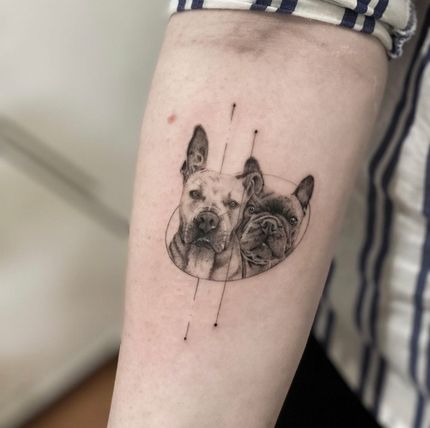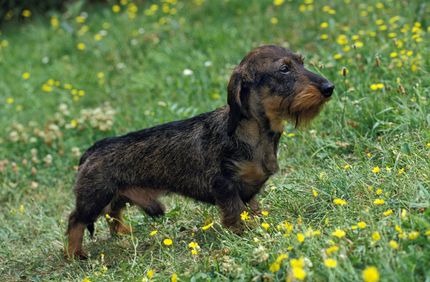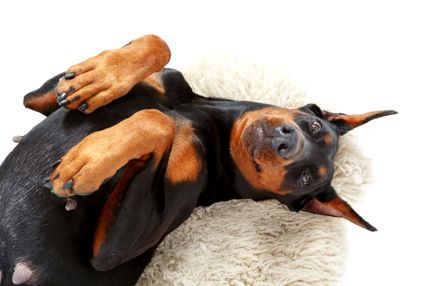Facts & Origin
What is a Pyredoodle?
The Pyredoodle is a so-called hybrid dog breed that is the result of crossing a Great Pyrenees dog (also known as a Pyrenean Mountain Dog) and a Poodle - usually a Standard Poodle. The aim of this breed is to combine the alertness, calmness and imposing stature of the Pyrenean Mountain Dog with the intelligence, allergy-friendliness and trainability of the Poodle.
Other common names for this crossbreed are Great Pyrenees Poodle Mix, Pyreneesdoodle or, more rarely, Pyrepoo. As with many so-called designer dogs, the name is a combination of the two original breeds.
Criticism of hybrid dogs
As popular as hybrid dogs like the Pyredoodle have become, they are also often criticized. This is because, unlike recognized pedigree dogs, these crosses are not subject to a standardized breeding line, which means that appearance, character and health can vary greatly - even within the same litter.
In addition, the often propagated term "allergy dog" is misleading: no dog is truly hypoallergenic, even if some - like the poodle - shed less. The idea that all offspring combine the positive characteristics of both breeds is a pipe dream. In reality, problematic traits or health weaknesses can also be reinforced. Therefore, when choosing a Pyredoodle, a serious origin and responsible breeding are crucial.
| Alternate Name | Pyreneesdoodle, Pyrepoo |
| Origin | Germany - France |
| Life expectancy | 10 - 15 years |
| Care requirements | high-maintenance |
| Activity level | average to high |
| FCI group | not recognised |
| AKC group | not recognised |
| KC group | not recognised |
More Poodle mixes
More Pyrenean Mountain Dog mixes
Attitude, character and temperament of the breed
Possible character traits
A Pyredoodle can be a very balanced, loyal and family-friendly dog - provided its needs are understood and taken seriously. The calmness and independence of the Pyredoodle meets the eagerness to learn and sensitivity of the Poodle.
Typical characteristics:
A calm, watchful nature
Pronounced loyalty to his family
Protective instinct, which can be particularly evident in a rural environment
Intelligence and willingness to learn, but sometimes also a certain independence
Many Pyredoodles are very people-oriented, but are not classic beginner dogs. They need clear, patient leadership and consistent socialization in order not to become too territorial or suspicious of strangers.
If you are looking for an active, but not nervous companion who can calm down both outside and in the house, you will find an impressive, reliable partner in the Pyredoodle - if raised correctly.
Character
Usage
Care & possible diseases
Grooming a Pyredoodle depends heavily on the coat type inherited. Some dogs get the curly, densely textured coat of the Poodle, others the long, luxuriant top coat of the Pyrenean - many are somewhere in between.
In any case, regular brushing is necessary to prevent tangles and remove loose hair. Regular visits to the groomer can also be useful, especially for curly coats. As both parents are prone to certain health problems, you should pay attention to the following aspects in Pyredoodles:
Hip dysplasia (HD): particularly inherited from the Pyredoodle
Ear infections, especially with drooping, very hairy ears
Eye problems, such as cataracts or PRA
Epilepsy, in rare cases
A healthy breeding line, regular veterinary checks and species-appropriate husbandry are the best protection against such diseases.
Possible appearance
An adult Pyredoodle is usually a large, strong dog that can easily reach 30 to 45 kg. The shoulder height is often between 60 and 75 cm, depending on the size of the Poodle in the breed.
Coat colors vary greatly - from pure white to cream, grey, silver, beige and even bicolored varieties. The coat structure ranges from curly to slightly wavy, some dogs look more like Pyrenean Hounds, others like Poodles.
The expression is usually friendly, with dark, almond-shaped eyes and drooping or semi-erect ears. Many Pyredoodles appear majestic and elegant, but at the same time soft and approachable.
| Fur length | medium |
| Fur | curly - |
| Ear shape | Floppy Ear - Triangle |
| Tail | lang - fanned out |
| Anatomy | slim, sporty, rugged, massive |
| Size ♀ | 45 - 74 cm |
| Weight ♀ | 18 - 41 kg |
| Size ♂ | 45 - 82 cm |
| Weight ♂ | 18 - 54 kg |
| Suitable For | - |
Known Diseases
Epilepsy
Definition: Dog has epilepsy if, for example, at least two epileptic seizures occur more than 24 hours apart.
Cataract
Cataracts are still one of the most common causes of blindness, even in dogs.
Progressive Retinal Atrophy (PRA)
Progressive retinal atrophy (PRA) is a slowly progressive death of the retina in dogs.
Patellar problems
Problems with the Patellar can be a displacement or weak kneecap, which is one of the most common causes of lameness in dogs, also because of overweight.
Eye diseases
Often occur with allergies and intolerances.
FAQ
-
Most Pyrenean Mountain Dogs and Poodle mixes have a coat that is a mixture of both breeds, but some may be more strongly marked by one breed or the other. They are typically large dogs with a muscular build.
-
The Pyredoodle is a loyal and loving dog. They get on well with children and other pets. They are also very intelligent and can be easily trained.
-
This mongrel needs a lot of exercise. They are happiest when they have something to do or a job to do. A daily walk or run is a must for this breed.
-
The Pyredoodle requires regular grooming. They may need to be brushed a few times a week, depending on their coat, and their coat may need to be trimmed every few months.
-
Pyredoodles are generally healthy. However, like all breeds, they can be prone to certain health problems. Some of the health conditions this breed can be prone to are hip dysplasia, elbow dysplasia and allergies.

















